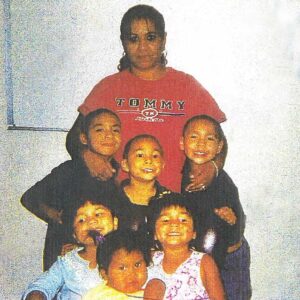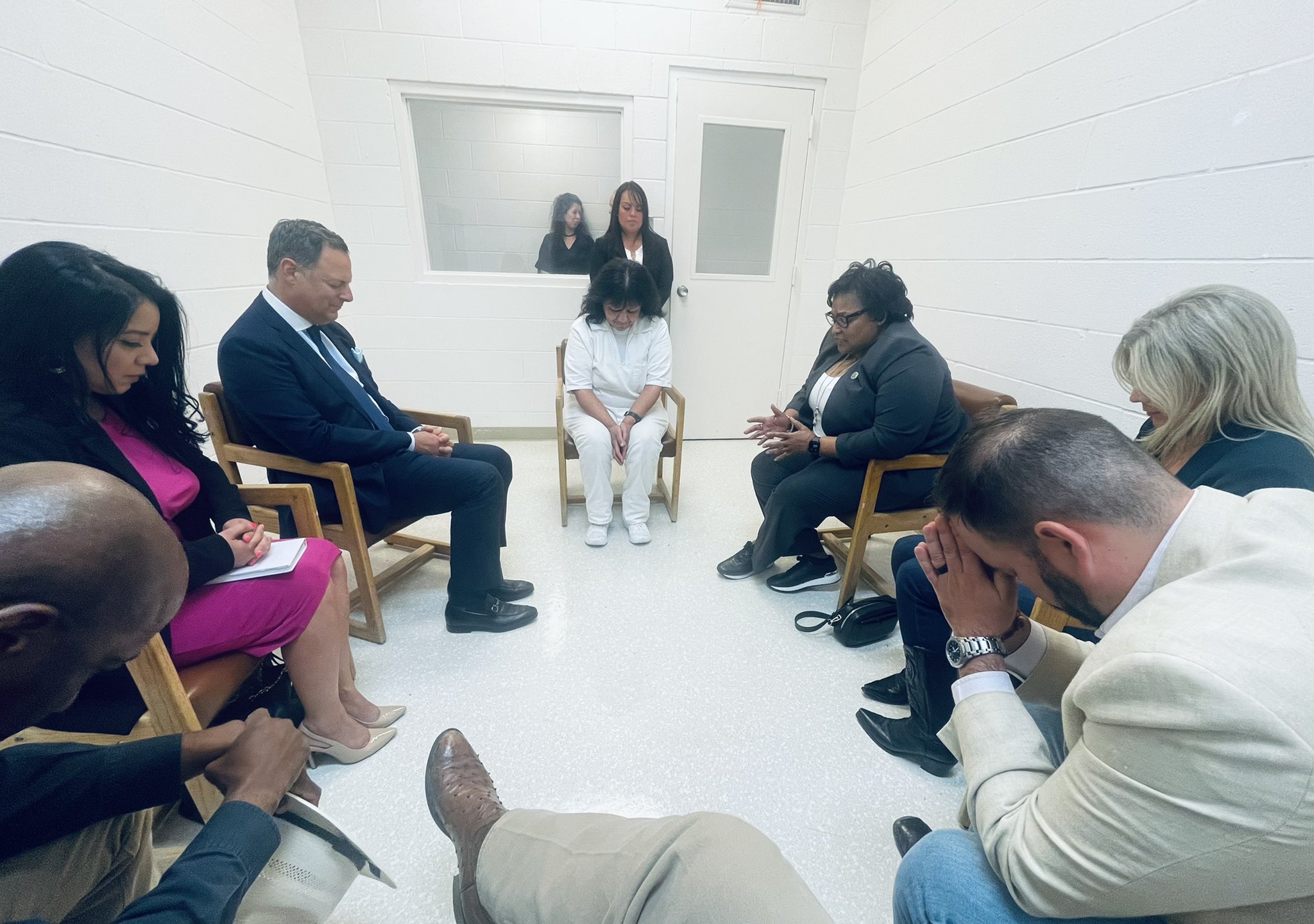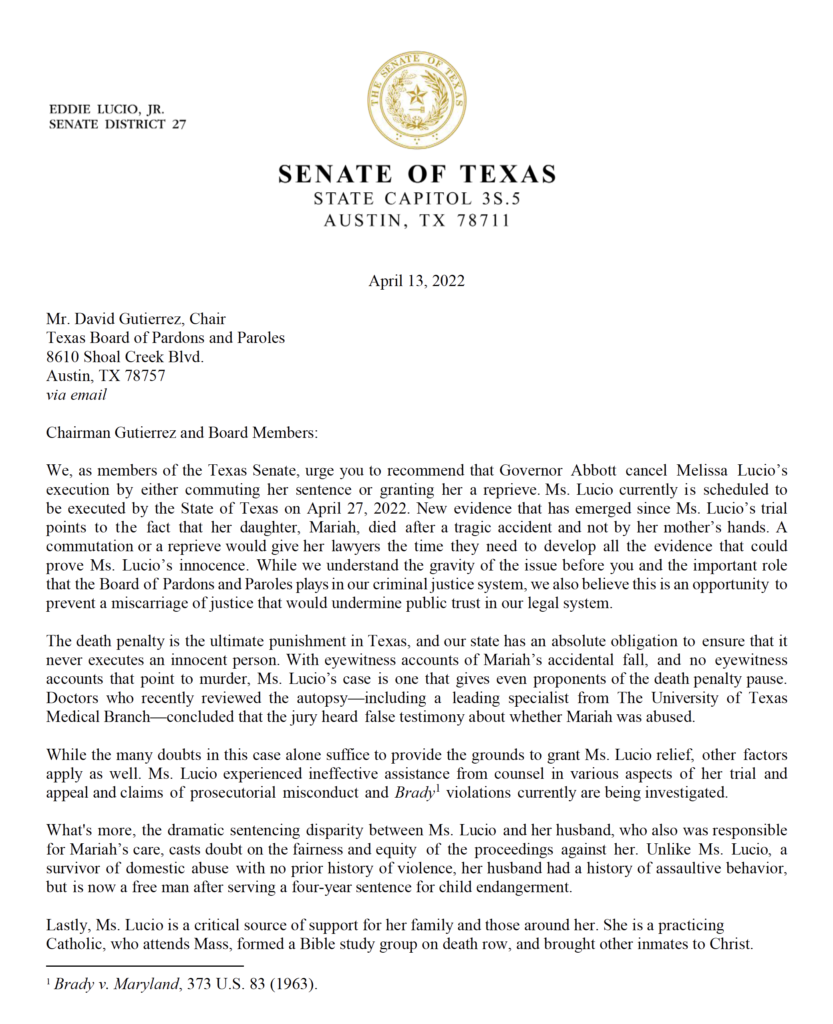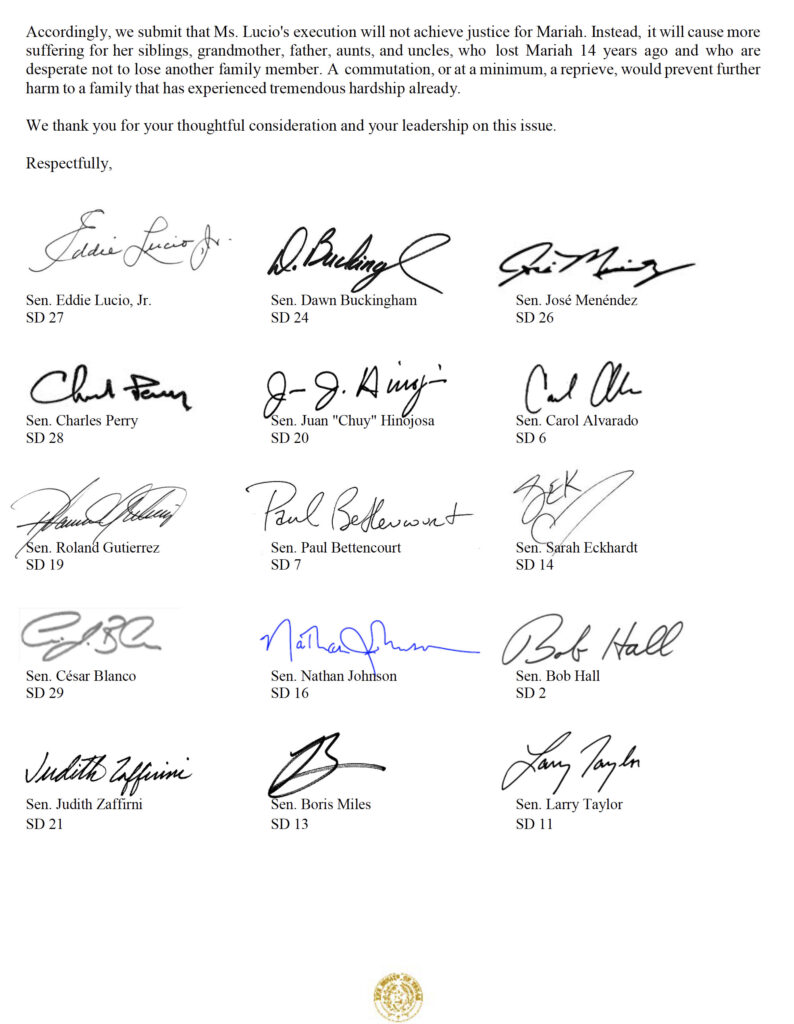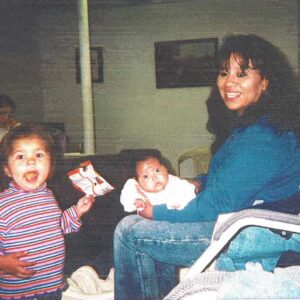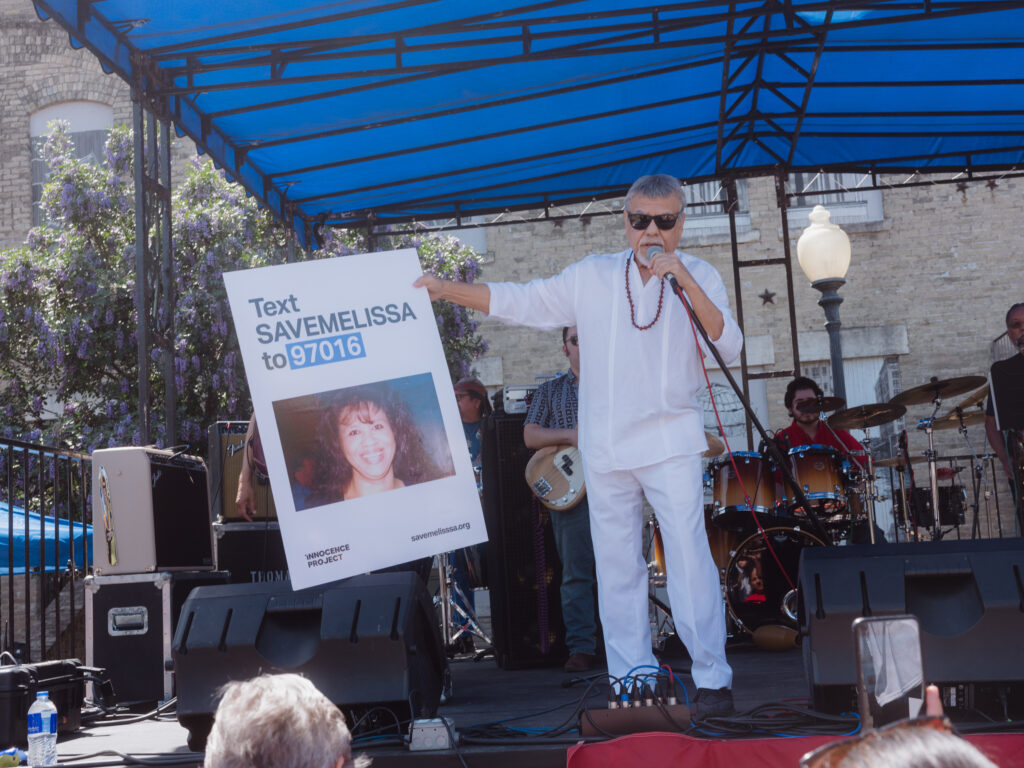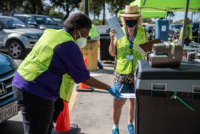Today, Melissa Lucio’s attorneys submitted a supplemental clemency application to the Texas Board of Pardons and Paroles and Governor Abbott. Melissa is facing execution on April 27, 2022 for the accidental death of her daughter, Mariah, who died from complications after a fall down steep outdoor stairs.
The supplemental application includes a new declaration from a fifth juror — Melissa’s jury foreperson — who joins the calls of four other jurors and the alternate to halt Melissa’s pending execution or grant her a new trial where new evidence of her innocence can be considered.
Melissa’s supplemental application also includes “new declarations from key witnesses who demonstrate that the prosecution’s case against Melissa was based on false or misleading testimony” and introduces “new scientific evidence of Melissa’s innocence, analysis of the gender bias that infected Melissa’s investigation and prosecution, and additional community support for clemency.” (Supp. App. at p. 1.)
“I believe that Ms. Lucio deserves a new trial and for a new jury to hear this evidence.”
On March 22, 2022, Melissa filed her clemency application, which included “seven new reports, including from nationally recognized medical professionals, a pathologist, a police trainer, clinical psychologist, and neuroscientist that disprove every element of the prosecution’s case against her. It also explained that Melissa’s investigation, prosecution, and sentence were infected with bias, perhaps most evident in the disparate treatment between Melissa and Mariah’s father, Robert. And it included support for clemency from every single one of Melissa’s children; four of the jurors who voted to sentence Melissa to death; and a wide range of individuals and organizations, from faith leaders to anti-violence advocates.” (Supp. App. at p. 1.) A bipartisan group of more than 80 Texas House of Representatives have also asked the Board to grant Melissa clemency.
Melissa Lucio’s Supplement to Application for Commutation of Death Sentence to a Lesser Penalty or, in the Alternative, a 120-Reprieve from Execution can be viewed here: https://tinyurl.com/2s39jsah
Supplemental Clemency Exhibits can be viewed: here
Melissa’s Clemency Application, which was filed on March 22, 2022, can be accessed here.
Clemency Exhibits Volume I: here
Clemency Exhibits Volume II: https://tinyurl.com/45vrbjhn
PDF of Table of Contents/Index: https://tinyurl.com/msfkzyhw
Jury Foreperson Joins Four Other Jurors in Calling for Relief for Melissa Lucio
Melissa’s supplemental clemency application includes a new declaration from Melissa Quintanilla, who was the foreperson of the jury that convicted Melissa and sentenced her to death. Ms. Quintanilla’s declaration states: “I was disheartened to learn that there was additional evidence that was not presented at trial. I believe that Ms. Lucio deserves a new trial and for a new jury to hear this evidence. Knowing what I know now, I don’t think she should be executed.” (Supp. App. at p. 11. Supp. Exhibit 13 at pp. 2-3.) There are now five jurors who voted to sentence Melissa to death, and one alternate, who support relief for her.
Melissa’s Conviction and Sentence Rested on False, Misleading, and Incomplete Testimony
Melissa’s supplemental application includes additional declarations that the prosecution concealed evidence from the defense and presented false and misleading testimony to obtain her conviction and death sentence, including:
- The declaration of Lucy Arreola, a former CPS investigator who was assigned to investigate Mariah’s death. Ms. Arreola interviewed Melissa’s children and confirmed they did not allege physical abuse by Melissa and corroborated her account of the events surrounding Mariah’s death. Ms. Arreola’s reports and recordings were not disclosed to Melissa’s trial counsel. (Supp. App. at pp. 13-14. Supp. Exhibit 8.)
- Journalist Chandra Bozelko provided a declaration that reveals the prosecution misrepresented Melissa’s jail records during their closing arguments at the penalty phase. Later, the Texas Court of Criminal Appeals relied on the mischaracterization of Melissa’s jail records to support the jury’s finding that Melissa would likely commit future acts of violence if sentenced to life in prison. As Ms. Bozelko details, Melissa had no record of violence in the jail. (Supp. App. at p. 15. Supp. Exhibit 17.)
- A therapist who met with Melissa before her 2008 trial provided a declaration that the prosecution’s use of his reports was “misleading.” The prosecution used the therapist’s reports to claim that Melissa had denied being sexually abused as a child when, in fact, Melissa reported to the therapist that she had been. (Supp. App. at pp. 15-16. Supp. Exhibit 11.)
New Expert Reports: As a Survivor of Childhood Abuse and Domestic Violence, Melissa was Uniquely Vulnerable to Police Interrogation Tactics
Melissa’s supplemental application also includes the reports of two experts in clinical psychology, Dr. Bethany Brand and Dr. Lucy Guarnera, who, respectively, explain how Melissa’s history of childhood sexual abuse and domestic violence made her uniquely vulnerable to the pressure tactics used in the police interrogation and explain the recent evolution of scientific research linking trauma, like Melissa endured, to false confession risk. Dr. Brand notes that Melissa “endured a truly horrendous level of extreme and frequent childhood sexual abuse.” Dr. Brand concludes, “[t]he paramedics and detectives who opined that Melissa did not show as much emotion as they thought a mother should show had no awareness of her complex history of trauma, her severe mental illnesses, nor that Melissa had survived daily abuse and degradation by dissociating and suppressing strong emotion.” (Supp. App. at p. 5. Supp. Exhibit 2 at 16.)
Dr. Guarnera, an Assistant Professor of Psychiatry and Neurobehavioral Sciences at the University of Virginia School of Medicine, explains new scientific research, not available at the time of Melissa’s trial, on the link between trauma and false confessions. Dr. Guarnera notes that “the dynamics of the Reid techniques of police interrogation [which were used during Melissa’s interrogation]—particularly when the interrogation is carried out by male police officers—mirror precisely the dynamics of intimate partner violence.” (Supp. App. at p. 5. Supp. Exhibit 6 at 4.)
In addition, Dr. Guarnera provides critical information about how the factors leading to Melissa’s wrongful conviction are reflected in the national data on wrongful convictions of women accused of killing children. Dr. Guarnera cites a 2014 analysis of the National Registry of Exonerations that indicates “women are nearly twice as likely as men to be wrongfully convicted of child homicide (30% vs. 16%), and three times as likely as men to be wrongfully convicted of crimes that never occurred (63% vs. 21%). In over half (56%) of these no-crime exonerations of women, the supposed victims were children. Further, in one out of seven formal exonerations of women, the woman was accused of murdering a child who in reality died of an unrelated accident or undiagnosed pathology.” (Supp. App. at p. 6. Supp. Exhibit 6 at 5.)
New Expert Report: Abuse of Trial Court’s Discretion to Permit Texas Ranger to Testify About His Ability to Determine Melissa’s Guilt or Innocence by Her Facial Expressions
Melissa’s supplemental application also includes a declaration from David Faigman, Chancellor and Dean of the University of California Hastings College of Law, who served as a Senior Advisor to the President’s Council of Advisors on Science and Technology’s Report, “Forensic Science in Criminal Courts: Ensuring Scientific Validity of Feature-Comparison Methods,” who concludes that “it was an abuse of the trial court’s discretion to permit Ranger Escalon to testify regarding his ability to determine Ms. Lucio’s guilt or innocence by interpreting her facial expressions and demeanor.” (Supp. App. at pp. 6-7. Supp. Exhibit 3 at 2.) Professor Faigman further concludes, “[t]he prejudicial nature of this error was compounded by the fact that the substance of the scientific testimony in question was false as a matter of neuroscientific consensus.” (Supp. App. at p. 7. Supp. Exhibit 3 at p. 2) (emphasis added).
Gender Bias Affected Melissa’s Investigation and Prosecution
Melissa’s supplemental application states, “[f]rom the moment they arrived at the scene of Mariah’s death, police and first responders formed judgments about [Melissa] that were rooted in their perceptions of how a grieving mother should behave. These visceral impressions led them to target her as a suspect even before they had gathered any evidence in the case.” (Supp. App. at p. 7.) In contrast, they treated Robert Alvarez, Melissa’s partner and Mariah’s father, as a victim and expressed empathy for his loss, even though he had a history of familial violence. (Supp. App. at pp. 7-8.)
A declaration submitted by forensic linguist Professor Robert Leonard concludes that the language the police used while interrogating Robert is largely consistent with an effort to gather information, rather than assign blame. On the other hand, Professor Leonard states that the officers interrogating Melissa “used language that sought to blame her for Mariah’s injuries. They rejected her repeated assertions of innocence.” (Supp. App. at p. 9.) They also “repeatedly invoked Melissa’s caretaking role during their interrogation, seeking to provoke self-blame—and a confession—for failing to live up to her role as a mother.” (Supp. App. at p. 9. Supp. Exhibit 4 at p. 21.)
In a stunning analysis of differential treatment, Professor Leonard notes that the interrogating officers “did not allow [Melissa] to complete her thoughts: whereas the police only interrupted Robert once, they interrupted Melissa over 70 times while she was trying to answer or defend herself.” (Supp. App. at p. 9. Supp Exhibit 4 at p. 10.) Today, although both parents were responsible for Mariah’s care, Melissa is facing execution and Robert is a free man.
Growing Calls for Clemency from Survivor Organizations
Melissa’s supplemental application cites the growing support for clemency from community groups working to address family violence and sexual assault in Texas. In a letter to Governor Abbott, the Texas Council on Family Violence and the Texas Association Against Sexual Assault wrote: “Melissa Lucio’s looming execution date is an opportunity to send a strong statement of compassion for a victim who suffered a lifetime of violence without diminishing the tragic and complex outcome of her case.” (Supp. App. at p. 12. Supp. Exhibit 1.)
The supplemental application also includes a letter from four women who were wrongfully convicted of the murder of their own children who write: “We have stood in Melissa’s shoes, facing accusations of causing harm to our child when, in reality, no crime had occurred, or someone else was responsible. Like Melissa, some of us experienced lifelong trauma from sexual and physical abuse prior to our wrongful convictions.” (Supp. App. at p. 13. Supp. Exhibit 10.) Later today, a letter supporting clemency will be submitted by the Lone Star Justice Alliance, which includes 40 organizations and experts in Texas who work with survivors of human trafficking and domestic violence.
A case overview appears below my signature. Thank you for considering coverage of this new information in Melissa Lucio’s innocence case and letting me know if you would like to speak with one of her attorneys.
Best wishes,
Laura
laura.burstein@squirepb.com
(202) 669-3411
Melissa Lucio Case Summary
A Victim of Sexual Abuse and Domestic Violence Wrongly Convicted and Condemned to Die for the Accidental Death of Her Daughter
Introduction
Melissa Lucio, a Mexican-American who is facing execution in Texas on April 27, 2022, was wrongfully convicted and sentenced to death after her daughter, Mariah, sustained injuries from an accidental fall. Although Melissa repeatedly told the police that she did not kill her daughter, they continued to interrogate her for five hours until she agreed, falsely, to take responsibility for some of her daughter’s injuries.
Melissa suffered a lifetime of sexual abuse and domestic violence, which made her especially vulnerable to the police’s coercive interrogation tactics. Melissa had no history of violence, but her husband, Mariah’s father, was found guilty of child endangerment and sentenced to four years, even though he had a history of assaultive behavior.
Struck by the sentencing disparity and grave doubts about the reliability of Melissa’s conviction, a bipartisan group of more than 80 members of the Texas House of Representatives oppose Melissa’s execution. Hundreds of Texas anti-domestic violence groups, Baptist, Evangelical and Catholic leaders, Latino organizations, exonerees of wrongful convictions, and Melissa’s children are urging the Texas Board of Pardons and Paroles and Governor Abbott to grant Melissa clemency.
Melissa’s execution would cause further suffering for her children who lost their sister 15 years ago. It would also be the first execution of a Latina in the United States since the resumption of the death penalty in the 1970s.
Clemency Application Cites New Evidence Supporting Melissa’s Innocence Claim
On March 22, 2022, Melissa’s attorneys submitted an application for clemency to the Governor and the Board of Pardons and Paroles which includes the declarations of seven nationally recognized experts, including experts in false confessions and medical and forensic experts, who have reviewed the evidence and concluded that Melissa’s conviction was based upon:
(1) an unreliable “confession” that is essentially a mere “regurgitation” of facts and words officers fed to her during the five hour interrogation, and
(2) unscientific, false evidence that misled the jury into believing that Mariah must have been killed by physical abuse, when the evidence is actually consistent with a conclusion that Mariah died from medical complications after a fall.
The application also documents that Melissa asserted her innocence more than 100 times over five hours of the coercive interrogation.
In addition to the new forensic analyses, the clemency application includes declarations from five jurors stating they have grave concerns about evidence withheld from them at Melissa’s capital trial and would support relief. An additional juror, an alternate who heard the evidence, but did not join deliberations, also submitted a declaration supporting relief for Melissa.
The District Attorney, the courts, the Texas Board of Pardons and Paroles, and the Governor must undertake a meaningful review of Melissa’s case. That review can only happen if the execution date is withdrawn or stayed.
A Rush to Judgment After a Tragedy
On February 15, 2007, as Melissa was moving her family to a new home, Mariah fell down a steep outdoor staircase leading to their apartment. After the fall, Mariah’s injuries did not appear life-threatening, but two days later she fell asleep on her parents’ bed and did not wake up. Mariah had physical disabilities that made her walking unstable and she had a history of falls, including a recent fall at a preschool program where she lost consciousness. At the time of her arrest, Melissa had no history of abusing her children or violence of any kind. (App. at pp. 2, 10-12.)
Two hours after Mariah’s death, Melissa — grieving and in shock — was hauled into an interrogation room where, for over five hours, armed, male police officers stood over her, yelled at her, threatened her, berated her parenting, and repeatedly refused to accept anything less than an admission to causing her daughter’s death. Melissa was especially vulnerable to the aggressive, intimidating, and psychologically manipulative interrogation tactics of the police and male authority figures due to her history of abuse, trauma, low IQ, and abnormally high levels of suggestibility and compliance. (App. at pp. 15-17.)
After hours of continuous interrogation, Melissa acquiesced, followed their directions, and gave in to their demands. She was sleep-deprived — it was early in the morning by then — and pregnant with twins, emotionally and physically exhausted by the threats and manipulation. (App. at pp. 15-17, 39.)
Two experts on false confessions (including police trainer and interrogation expert, David Thompson, and Dr. Gisli Gudjonsson, one of the world’s leading experts on false confessions) have analyzed Melissa’s interrogation and concluded that her admissions are “unreliable” and simply a “regurgitation” of the words and facts that interrogators fed to her throughout a highly coercive interrogation process. (App. at pp. 16, 39-42.)
Lacking physical evidence or eyewitnesses connecting Melissa to Mariah’s death, Cameron County District Attorney Armando Villalobos — who is now serving a 13-year federal sentence for bribery and extortion — characterized Melissa’s acquiescence during the interrogation as a “confession” to murder. (App. at p. 19.)
Mariah’s Death Was Declared a Murder Before the Autopsy Even Began
The application states: “[The State’s Medical Examiner] Dr. Farley, who was told going into autopsy that Melissa had ‘confessed’ to abusing Mariah, and who was accompanied in the autopsy suite by two of the interrogating officers, assumed everything she observed was evidence of abuse and ignored all evidence to the contrary.” (App. at p. 20.)
At Melissa’s trial, the jury was told that Mariah’s injuries could only be explained by child abuse and complications from an accidental fall were impossible. That testimony was false. Dr. Farley failed in her duty to rule out nonviolent medical explanations for Mariah’s condition before rushing to agree with law enforcement’s judgment of abuse. (App. at pp. 19-20, 28.)
Seven experts, including nationally recognized medical and forensic scientists, have now reviewed the evidence in Melissa’s case. Dr. Michael Laposata, the chairman of the Department of Pathology at the University of Texas Medical Branch at Galveston, concluded that at the time of her death Mariah had indications of Disseminated Intravascular Coagulation (DIC), a disorder that causes extensive bruising following a head trauma, like the injury that Mariah suffered from her fall, or an infection. (App. at p. 21.)
As Dr. Laposata stated in his declaration, DIC can cause profound bruising throughout the body with no trauma whatsoever. “In patients with DIC, routine handling at home or in a hospital setting can cause significant bruising. It is not possible to tell the difference between a bruise from DIC and a bruise from abuse.” (Exhibit 6 at p. 2.)
Dr. Janice Ophoven, a pediatric forensic pathologist, concluded that Mariah’s autopsy indicates she was in DIC at the time of her death. Her records also show she had a persistent high fever, and was sufficiently dehydrated to experience shock. The application states: “[S]teeped in extrinsic, biasing information, [Dr. Farley] failed to review any of Mariah’s medical history to look for any explanation or contributing cause to her injuries, conduct any basic laboratory tests to diagnose a coagulation disorder, or even perform simple testing to confirm the presence of infection or sepsis.” (App. at p. 28.)
Five jurors who served on the jury that sentenced Melissa to die and one alternate juror have expressed grave concerns about the evidence that they were not allowed to hear. Juror Johnny Galvan stated that “[t]he fact that you can’t pinpoint what caused Mariah’s death means that [Melissa] shouldn’t be executed.” Juror Alejandro Saldivar stated, “I think if I heard this evidence I may have decided differently.” (App. at p. 3.)
Melissa’s Lifetime of Sexual Abuse and Domestic Violence Made Her Especially Vulnerable to Coercive Interrogation Tactics
Melissa’s uncle and stepfather sexually abused her over a period of years, starting when she was six years old. She told her mother, but nothing was done. As a young teenager, she was raped again by an adult man. (App. at p. 44.)
At age 16, Melissa got married, becoming a child bride, to escape the abuse she suffered and witnessed in her childhood home. (App. at p. 45.) Melissa’s first husband was a violent alcoholic, according to testimony at trial (App. at p. 45.) He abandoned Melissa after she gave birth to five children. Melissa’s next partner continued the cycle of violence and abuse. She had seven children by her second husband. He beat Melissa, choked her, threatened to kill her, and repeatedly raped her. Some of Melissa’s children also reported that he struck them. (App. at pp. 45-47.)
The family sunk deeper into poverty and was intermittently homeless. Melissa worked cleaning houses and sought other jobs when she could. Her partner Robert was jailed for months at a time. By the time Melissa was 35, she was struggling with abuse, cognitive and psychological impairments, addiction, and poverty. She had given birth to 12 children and suffered multiple miscarriages. (App. at p. 9.)
Melissa’s Statements Have the Hallmarks of a False Confession
Over five hours, Melissa asserted her innocence 86 times verbally and 35 times non-verbally (shaking her head), but police refused to accept any response that was not an admission of guilt—suggesting to Melissa that the interrogation would not stop unless she told them what they wanted to hear. (App. at p. 15.) While the vast majority of interrogations last 30 minutes to up to two hours, interrogations that elicit confessions later proven false last much longer. “[T]he length of Melissa’s nighttime interrogation further increased the risk that she would falsely incriminate herself.” (App at pp. 16, 36-37.)
The interrogating officers used manipulative, psychological techniques known to cause false confessions and disregarded Melissa’s multiple vulnerabilities, including her shock and grief over her daughter’s death hours earlier, physical and emotional exhaustion, sleep deprivation, her high levels of suggestibility and compliance, and low IQ. (App. at pp. 37-39.) According to experts, Melissa’s lifetime of sexual abuse, starting at six years old, and domestic violence at the hands of two partners, made her extremely vulnerable and susceptible to falsely confessing during an interrogation by male police officers, some armed. One detective yelled at her: “[i]f I beat you half to death like that little child was beat, I bet you you’d die too.” (App. at pp. 35, 42-47.)
Doctor Gisli Gudjonsson, one of the world’s leading experts in false confessions, and David Thompson, an expert from one of the nation’s top interrogation training schools, have reviewed the record of Melissa’s case and determined that Melissa “was relentlessly pressured and extensively manipulated” throughout the many hours of interrogation and her statements bear the hallmarks of a coerced-compliant false confession. (App. at pp. 15-16.)
Dr. Gudjonsson concluded that Melissa’s case presents a “very high” risk of false confession and in his “extensive forensic evaluation of cases of disputed confessions internationally, the number, severity, and combination of the risk factors involved during the lengthy interrogation are exceptional.” (App. at 16.) He further explained Melissa’s “history of negative/traumatic life events is associated with increased level of suggestibility, compliance, and false confession . . . because trauma significantly reduces the resilience of the trauma victims to cope with interrogative pressure.” (App. at p. 37.)
Mr. Thompson noted, “[r]epetitive threats combined with promises or suggestions of leniency are known to incentivize innocent subjects to confess. These tactics, alongside Ms. Lucio’s susceptibility and her state of mind in a lengthy interrogation shortly after her daughter’s death, are known to have a substantial psychological impact on a subject’s decision-making” and found her statements are a result of fact-feeding or other tactics used by investigators. (Exhibit 11 at pp. 5-6.)
False confessions elicited by guilt-presumptive police interrogations—like the interrogation at issue here—are a primary cause of wrongful conviction in the United States. Of the 67 women listed on the National Registry of Exonerations who were exonerated after a murder conviction, over one quarter (17/67) involved false confessions and nearly one third (20/67) involved child victims.
What the Jury Never Heard
The jury never heard how Melissa’s history of trauma and abuse shaped her reactions immediately following her daughter’s death. Without that context, the jury convicted Melissa of capital murder. (App. at p. 13.)
Melissa’s trial attorneys were not prepared for the penalty phase of the trial. Lead counsel hamstrung his mitigation specialist and expert until weeks before the trial began. As a result, Melissa’s mitigation specialist never completed her investigation and the jury never learned about the extent of Melissa’s history of child sexual abuse and domestic violence.
The omission of this mitigating evidence was particularly damaging because the prosecution had a weak case for death. Melissa had no prior record of violence and the State’s sole evidence of future dangerousness was the death of Mariah and a prior conviction for driving under the influence. (App. at p. 62.)
So Far, the Courts’ Hands Have Been Tied
A majority of judges have agreed that the trial court was wrong to exclude the psychologist’s expert testimony, which would have provided an explanation for Melissa’s acquiescence during the coercive interrogation. “The State presented no physical evidence or witness testimony establishing that [Melissa] abused Mariah or any of her children, let alone killed Mariah,” seven Fifth Circuit judges wrote. By excluding expert explanations for Melissa’s remarks during her interrogation, the trial court wrongfully barred Melissa’s right to present her defense. (App. at p. 13.) But a divided Fifth Circuit believed that current federal law cuts off the courts’ ability to correct this injustice
On February 18, 2022, the Inter-American Commission on Human Rights (IACHR) issued a resolution calling on officials not to execute Melissa before the Commission has had an opportunity to reach a final decision in her case. The Commission considered the evidence that Melissa’s “life was shaped by physical, emotional, and sexual abuse,” and that the same experiences shaped her response to a coercive interrogation.
Disparate Sentencing in Melissa’s Case
Melissa regrets not getting medical care for Mariah earlier, but she is not guilty of murder. Her husband, Mariah’s father, was found guilty of child endangerment and sentenced to four years, even though he had a history of assaultive behavior. At most, a charge of neglect was more appropriate for Melissa than murder. (App. at p. 3.)
Corrupt Cameron County DA Villalobos personally led Melissa’s prosecution. In 2007, in exchange for a bribe, he enabled the release and flight from justice of Amit Livingston, a man who had killed his estranged girlfriend. As DA Villalobos was scheming to facilitate the release of this male batterer, he was pursuing the death penalty against a woman who was a lifelong victim of sexual abuse and domestic violence. Former DA Villalobos is now serving a 13-year federal sentence for bribery and extortion. (App. at p. 19.)
Melissa is a Person of Deep Catholic Faith Who Walks with God
Melissa grew up without much religious instruction, but began her walk with God on September 26, 2014. She is a person of deep Catholic faith who attends Catholic mass services every Monday and meets individually with a pastor, Deacon Ronnie, on Thursdays and Sundays. In 2015, Melissa and other women on death row formed a Bible study group where, she says, “we all help each other.” Her main concern now is for her family, especially having her children support each other. Because of Melissa, her son John has also devoted himself to God, and she reads a Bible verse to him at the beginning of each of their visits. (App. at pp. 54-61.)
Widespread Support Across Texas for Clemency
Alarmed by the prospect of executing an innocent woman, who is a lifelong survivor of sexual abuse and domestic violence, a wide and diverse array of Texans are urging the Governor and the Board to grant Melissa clemency, including:
- A bipartisan group of more than 80 members of the Texas House of Representatives;
- 225 anti-domestic violence/sexual assault organizations from Texas and across the country;
- Over 130 Baptist, Evangelical and Catholic faith leaders in Texas, including more than 50 Baptist leaders, the Executive Director of the Hispanic Baptist Convention of Texas, and the Director of the Rio Grande Valley Baptist Association;
- More than 30 groups that work on behalf of Latinos in Texas and across the U.S., including the National Hispanic Caucus of State Legislators (NHCSL);
- Eighteen people wrongfully convicted of a crime in a Texas state court, including Hannah Overton and Michael Morton; and
- Twenty-six death row exonerees, including two from Texas.
Melissa’s children are also urging the Governor and the Board not to execute their mother. They are Mariah’s brothers and sisters and Texas law requires that their wishes be taken into account. (App. at pp. 1-2, 49-51.)
More than 200,000 people, including more than 33,000 in Texas, have signed an Innocence Project petition urging clemency for Melissa.
Abused Latinas and Wrongful Convictions
Of the 67 women listed on the National Registry of Exonerations who were exonerated after a murder conviction, over one quarter (17/67) involved false confessions and nearly one third (20/67) involved child victims.
Roughly one in three Latinas will suffer intimate partner violence in her lifetime, but the rates are higher for Latinas like Melissa who struggle with poverty and who were sexually abused as children. Also, research indicates that police tend to disbelieve women of color when they report domestic violence. At Melissa’s death penalty trial, the prosecution belittled the evidence of Melissa’s history of sexual abuse and domestic violence. (See trial transcript vol. 39 pp. 161-62.)
According to the Death Penalty Information Center, since 1973, 186 people have been exonerated from death row, including 16 in Texas, and the number of people whose lives were taken before they were able to prove their innocence is unknown.
###
For more information on Melissa Lucio’s innocence case, please visit https://innocenceproject.org/who-is-melissa-lucio-death-penalty-texas-execution-innocent/ and The Cornell Center on the Death Penalty Worldwide at https://deathpenaltyworldwide.org/advocacy/melissa-lucio/
The post Jury Foreperson Supports New Trial for Melissa Lucio, Other New Evidence in Supplemental Clemency Application appeared first on Innocence Project.
This post was originally published on Innocence Project.





